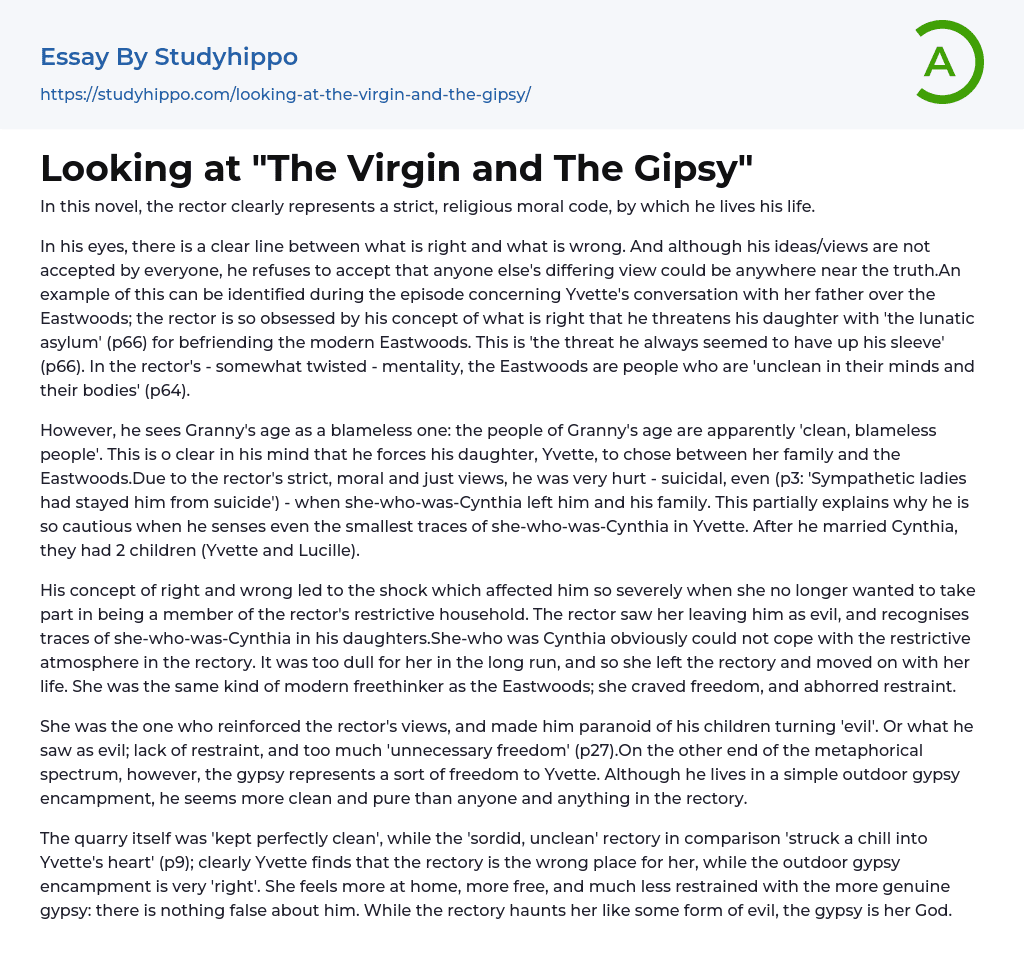It is evident in the novel that the rector embodies a strict interpretation of religious morality, which guides his behavior.
In the rector's perspective, distinguishing between right and wrong is crystal clear. Despite the non-unanimous agreement on his ideals, he staunchly opposes any opposing concepts or theories that differ from his own. A prime example of this is highlighted in the incident in which Yvette discusses the Eastwoods with her father, whereby the rector's obsession with his standard of rectitude leads him to threaten his daughter with institutionalization at 'the lunatic asylum' (p66) for interacting with the modern Eastwoods. This threat is a reflection of his persistent mentality towards people like the Eastwoods, whom he regards as 'unclean in their minds and their bodies' (p64).
Despite his strict views, the rector regards Granny's age as blamele
...ss. He believes that people of her age are clean and blameless. This belief is so strong that he compels his daughter Yvette to choose between her family and the Eastwoods. His moral and just principles cause him deep hurt when Cynthia leaves him and his family, leading him to contemplate suicide (p3: 'Sympathetic ladies had stayed him from suicide'). Thus, he is cautious when he detects even a hint of Cynthia's influence on Yvette. The rector and Cynthia had two children, Yvette and Lucille, during their marriage.
The shock which affected him greatly was caused by her decision to no longer take part in the rector's restrictive household due to her modern freethinking concept of right and wrong. The rector considered her departure as evil and noticed similarities between his daughters and she-who-was-Cynthia. She-who-was-Cynthia, being a modern freethinker like the Eastwoods
found the rigid environment in the rectory intolerable and left to pursue a more liberating life.
On one hand, the rector's views were bolstered by her, causing him to fear his children succumbing to a type of evil that he defined as a lack of control and excessive freedom (p27). Conversely, Yvette views the gypsy as a symbol of liberty despite living in a basic outdoor encampment; in her eyes, he exudes an unparalleled sense of cleanliness and purity compared to anyone or anything at the rectory.
Yvette felt that the quarry was immaculate, in contrast to the rectory which she found unclean and unpleasant, leading to a feeling of discomfort. This is reflected in her preference for the gypsy encampment where she feels at ease, unconstrained, and genuine. The gypsy represents a source of comfort and truth to her, while the rectory has a negative influence on her. (p9).
- Values of Life essays
- Ethical dilemma essays
- Normative Ethics essays
- Virtue Ethics essays
- Belief essays
- Deontology essays
- Moral essays
- Virtue essays
- Work Ethic essays
- Nineteen Eighty-Four essays
- Maus essays
- Puritans essays
- Afterlife essays
- Buddhism essays
- Christianity essays
- Deism essays
- Faith essays
- God essays
- Hinduism essays
- Islam essays
- Jews essays
- Judaism essays
- Monotheism essays
- New Testament essays
- Ritual essays
- Sin essays
- Soul essays
- Theology essays
- Confession essays
- Devil essays
- Miracle essays
- Monk essays
- Revelation essays
- Atheism essays
- Immortality essays
- Jainism essays
- Sinners essays
- Bible essays
- Old Testament essays
- Salvation essays
- Temple essays
- Taoism essays
- Pilgrimage essays
- Freedom Of Religion essays
- Existence of God essays
- Christian Worldview essays
- Cosmological Argument essays
- Gautama Buddha essays
- Karma essays
- Buddha essays




